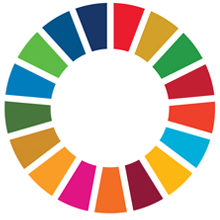A Sustainable Future: the role of microbiology in achieving the UN Sustainable Development Goals
25 January 2019

To celebrate the Microbiology Society’s 75th anniversary in 2020, we are launching a wide-ranging programme of events and activities to showcase why microbiology matters and demonstrate the impact of microbiologists past, present and future in addressing global challenges.
A sustainable future: the role of microbiology in achieving the UN Sustainable Development Goals
Microbiologists are involved in finding solutions to urgent problems, such as new and emerging diseases, through to long-term issues, like antimicrobial drug resistance, food security and environmental sustainability. This was demonstrated by Sir Alexander Fleming, the founder and first President of the Microbiology Society, whose discovery of the world’s first antibiotic has saved countless lives and transformed modern medicine.
As the Society approaches its 75th anniversary year, we are embarking on a project to demonstrate the value and raise the profile of microbiology in addressing the world’s biggest challenges. The focus will be on how microbiology can help to achieve the United Nations Sustainable Development Goals (UN SDGs).
The UN SDGs are a collection of 17 global goals and 169 targets, adopted by all Member States of the UN in September 2015. They are the successor to the Millennium Development Goals launched in 2000, but are more comprehensive, covering economic, social, and environmental issues, and far more ambitious. The UN describes them as:
“…the blueprint to achieve a better and more sustainable future for all. They address the global challenges we face, including those related to poverty, inequality, climate, environmental degradation, prosperity, and peace and justice. The Goals interconnect and in order to leave no one behind, it is important that we achieve each Goal and target by 2030”.
What is the role of the Microbiology Society?
Science, technology and innovation is recognised in the 2030 Agenda as critical to implementing the SDGs. Although the Goals are broad and interconnected, there are specific targets where the expertise of microbiologists is particularly relevant. For example, in recent years the Society has harnessed the scientific knowledge of our membership to inform and influence policy relating to antimicrobial resistance (SDG 3), climate change (SDG 13), biofuels (SDG 7), and food security (SDG2).
Our sustainable future project will demonstrate the value and raise the profile of microbiology in achieving the UN SDGs with decision-makers within the UK and the Republic of Ireland, as well as raising the profile of the SDGs within the microbiology community.
Building up to our 75th anniversary in 2020 we will be engaging with members on this project and identifying opportunities to engage with a range of stakeholders. The project will promote knowledge exchange and new collaborations by bringing together microbiologists, scientists, industry, NGOs, and policy-makers, to champion the importance of microbiology in sustainable development. This will drive us towards the Society’s vision of a world in which the science of microbiology provides maximum benefit to society.
Other activities in the Society’s anniversary programme include Why Microbiology Matters, a call to the community to nominate a discovery, event or activity that best highlights how microbiology answers big questions by giving us knowledge of very small things. Make your nomination (link to). In April 2020 we will celebrate the breakthrough scientific research recognised by our Fleming Prize. Drawing together outstanding scientists, the Fleming Showcase will outline a vision for the future impact of microbiology on science and society. Further information on our anniversary activities will be released on our website during 2019.
For further information on the UN SDGs please visit the UN webpage or follow #MicroGlobalChallenges
Please contact [email protected] if you are interested in getting involved in the sustainable future project.
Image: United Nations.
